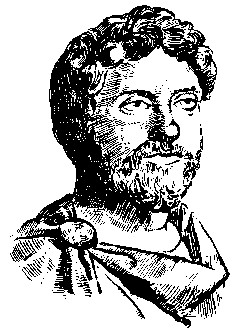 |
The Meditations
of Marcus Aurelius |
Marcus Aurelius was emperor of Rome from 161—180AD, and the Meditations are a collection of his thoughts, which he wrote down for his own benefit during his reign. They are fascinating, in that they portray the character—not only of the most celebrated Roman emperor—but of a person who has re-evaluated for themselves what it means to be alive.
The Meditations were originally written in Greek, but they
have been translated many times. The older translations tend to be better.
The complete Meditations can be read
online on the Internet Classics Archive.
XII, 32
. How small a part of the boundless and unfathomable time is assigned to every man? For it is very soon swallowed up in the eternal. And how small a part of the whole substance? And how small a part of the universal soul? And on what a small clod of the whole earth thou creepest? Reflecting on all this consider nothing to be great, except to act as thy nature leads thee, and to endure that which the common nature brings.II, 12
. If thou workest at that which is before thee, following right reason seriously, vigorously, calmly, without allowing anything else to distract thee, but keeping thy divine part pure, as if thou shouldst be bound to give it back immediately; if thou holdest to this, expecting nothing, fearing nothing, but satisfied with thy present activity according to nature, and with heroic truth in every word and sound which thou utterest, thou wilt live happy. And there is no man who is able to prevent this.IX, 30
. Look down from above on the countless herds of men and their countless solemnities, and the infinitely varied voyaging in storms and calms, and the difference among those who are born, who live together, and die. And consider too the life lived by others in olden times, and the life of those who will live after thee, and the life now lived among barbarous nations, and how many know not even thy name, and how many will soon forget it, and how they who perhaps now are praising thee will very soon blame thee, and that neither a posthumous name is of any value, nor reputation, nor anything else.IV, 18
. How much trouble he avoids who does not look to see what his neighbour says or does or thinks, but only to what does himself , that it may be just and pure; or as Agathon says, look not round at the depraved morals of others, but run straight along the line without deviating from it.